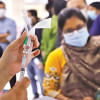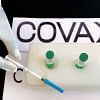Covid-19 vaccination: Bangladesh a role model

Bangladesh's Covid-19 vaccination campaign has so far turned out to be quite a triumph.
What started amid a cloud of scepticism about 14 months ago forged ahead, thanks to the government's quick thinking, smart diplomacy and people's enthusiasm in getting the jabs that would offer them protection against severe disease from coronavirus.
The World Health Organisation has set a target to vaccinate 70 percent of the global population with a two-dose regimen by the middle of 2022.
As of April 6, Bangladesh has administered one dose of the Covid-19 vaccine to 75.25 percent of the population, two doses to 67.37 percent and three doses to 9.10 percent -- figures that are the envy of many upper middle-income countries.
"People are saying that the government's vaccination programme has been a success," Health Minister Zahid Maleque told The Daily Star recently.
It is because of the success of the vaccination campaign that the economy is roaring, shops are buzzing with customers, students are back in the classrooms and social and religious activities are taking place unhindered, he said.
And despite the return to normalcy, infections and fatalities have remained low. For instance, Bangladesh yesterday reported just 48 fresh infections and, for the fourth day in a row, no deaths from Covid-19.
"The way we have been able to operate the vaccination programme is an example for the world. I don't know if any country in the world could administer one crore doses of vaccines in a single day," the minister said, adding that almost all eligible persons have received two shots of the vaccine.
But it has not always been smooth-sailing.
Bangladesh's vaccine roll-out began in January last year with AstraZeneca doses purchased from Serum Institute of India by way of Beximco Pharmaceuticals and commitments of 6.8 crore doses from Covax, a WHO-backed programme to provide shots to developing nations, by 2021.
After providing less than a third of the three crore doses agreed upon earlier, Serum discontinued supplies in April last year following an export ban slapped by the Indian government in the wake of a devastating wave of coronavirus cases in the neighbouring country.
Covax's pledge to supply vaccines to low-income countries also fell short due to "vaccine nationalism" by the high-income countries.
The twin developments had put the government's vaccination programme in a pickle.
But it compelled the government to dig deep for a new strategy. It courted nations through the diplomatic channels for shots, particularly of the AstraZeneca vaccines, and also decided to purchase 7.7 crore doses of the Sinopharm vaccine from China.
Soon, the vaccines started trickling in and the campaign picked up pace.
Supplies are only one part of a vaccination campaign; distribution and delivery are the other aspects, where many countries came undone.
To ensure that the vaccines are shot into as many arms of the targeted population, the government ran several special drives. The result was people flocking to vaccination centres.
As of March 27, Bangladesh received 29.64 crore doses from various sources, including gifts and Covax cost-sharing agreements, according to a report prepared by the health ministry on the status of vaccination.
The government bought 9.2 crore doses of vaccines -- 1.5 crore from Serum and 7.7 crore from Sinopharm -- under bilateral agreements.
Besides, the country got 9.62 crore shots in donations from Covax, 8.71 crore in cost-sharing agreement with Covax and 2.1 crore as gifts from countries with a surplus.
The government has spent about Tk 13,311 crore for purchasing and transporting vaccines, according to the finance ministry's cost estimation.
The amount includes $741 million of the $940 million the government got from the Asian Development Bank as loan.
About $75 million was given to Serum for the 1.5 crore doses of Covishield vaccines and another $550 million was spent for procuring vaccines under bilateral agreements.
The government is now mulling over readjusting the allocation for vaccine procurement, said a finance ministry official requesting anonymity.
There are enough doses, so the remaining $200 million from the ADB loan might not be needed.
"We have enough stock in hand. What we need now is administering the vaccines within the shortest possible time. Otherwise, the vaccines may go out of date," said a health ministry official preferring anonymity.


 For all latest news, follow The Daily Star's Google News channel.
For all latest news, follow The Daily Star's Google News channel. 








Comments